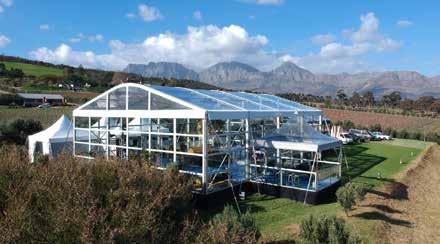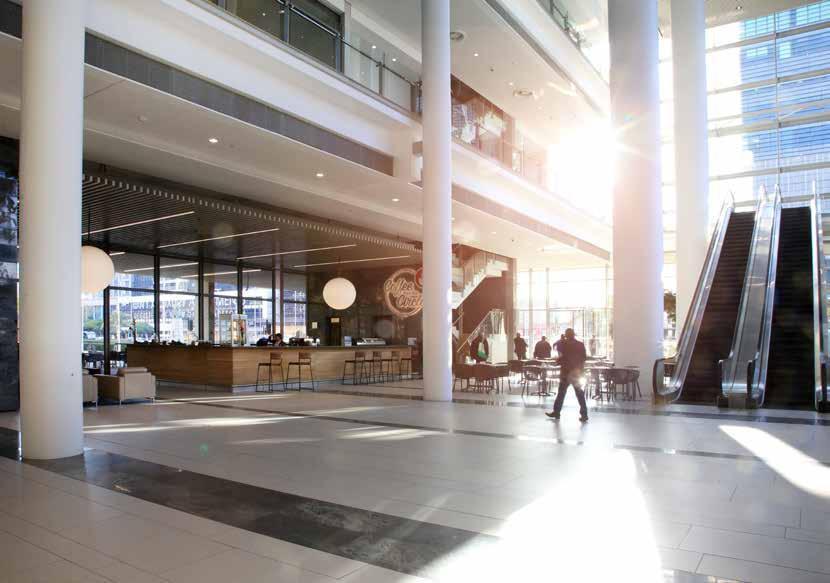
9 minute read
Up to us
by 3S Media
The Covid-19 pandemic has seen the events industry take a severe hit but if we are united in our efforts, we can weather the storm, writes Richard Downing, CEO of Downings Marquee Rentals.

Advertisement
Covid-19, SARS-CoV-2, coronavirus – whatever the name used for the viral pandemic we are currently facing, it has become synonymous with far-reaching consequences that are impossible to ignore as they have affected every single one of us.
We cannot dispute that the measures that have been put in place are crucial to limiting the spread of the virus. With a lockdown that is gradually being phased out to lower levels based on careful risk assessments intended to prioritise the safety of our nation’s citizens, each of us has a key role to play in how we manage the effects of the pandemic.


DOWN BUT NOT OUT Some industries have been much harder hit than others; the healthcare/medical sector is currently inundated but with no social gatherings permitted and only essential travel allowed within each province, business events and tourism have suffered a heavy blow, with the dip in activity resulting in a major loss in revenues. From organisers to service providers, the knock-on effects have now impacted the entire value chain, and this is likely to be long-lasting. From Downings’ perspective, we are offering different value propositions to alternative market segments, where our products and services are best suited to meet the needs of customers and deal with the challenges faced by our industry affiliates and partners. For operations that are primarily driven by events or rely on large gatherings of people for their day-to-day business, the current outlook is uncertain; however, we remain positive and committed to ensuring the availability of our resources.
IN THIS TOGETHER What we are seeing out of Covid-19 is just how much we are all part of an intricate ecosystem, and we are all in this together. There have already been quite a few casualties and, right now, it is more important than ever that we deal with the virus as proactively and as swiftly as possible to prevent more draconian measures needing to be put in place.
This is also where each of us needs to recognise that it is within our power to make a difference; at Downings, we are more committed than ever to our charitable causes and it has been encouraging to be part of the efforts being made to support local communities as far as possible. It is here where we know we are making a real, tangible contribution in the fight against Covid-19 (see page 12 of Meetings Lockdown Heroes Special Edition). For others, simply staying at home is what will save lives, as it limits the number of opportunities that the virus has to be transmitted to other people.
Covid-19 has and will continue to test our mettle like nothing we’ve ever faced before – even though its impact might be felt for a long time after it passes, it will not be permanent, and we will emerge from this stronger and more resilient.
In the interim, do what you can to survive, helping others to do the same, and be ready for action once the industry and world recover.
20 YEARS
O F EXCELLENCE

CAPE TOWN: +27 (0)21 851 8844 | cpt@downings.co.za JOHANNESBURG: +27 (0)11 942 9530 | jhb@downings.co.za
PORT ELIZABETH: +27 (0)41 373 2524 | pe@downings.co.za
MANAGING YOUR MENTAL HEALTH

Michelle Nortje is a clinical psychologist with a private practice in Johannesburg. Pippa Naude speaks to her on proactively managing your mental health during lockdown in the wake of Covid-19.
The current global pandemic has created multiple layers of consequences. There are huge individual and global health, financial, economic, systemic, and political repercussions that we will all be grappling with in the months to come. There have been tremendous changes to how our societies function and a loss of normalcy.
A strong emotional element accompanies these adjustments. Alongside a biological epidemic is also the possibility of an epidemic of fear. “Anxieties, worries, irrationality, fears, uncertainties, a sense of collective loss or grief, confusion, powerlessness, panic, a loss of safety and depression are expected experiences of many in facing the possibly devastating after-effects of Covid-19. These can be incredibly overwhelming experiences for people, both as individuals and as members of larger communities and countries,” explains Michelle Nortje, a Johannesburg-based clinical psychologist.
There are ways, however, in which we can help ourselves, our families and our communities to understand and manage our mental health in the present and over the next few months. It is important to prioritise and protect our mental health during such unprecedented times. Michelle provides us with a few ways to assist in curbing your anxiety during the
Covid-19 pandemic: 1 DON’T AVOID YOUR
FEELINGS If we can name it, we are more able to

manage it. Labelling and acknowledging our emotional states can allow us to feel more in control of our experiences, rather than feeling like our emotions are controlling us. Try to take some time each day to notice how you are feeling and give the feeling a name. By doing so, we can allow the feeling to be acknowledged and pass on.
Bottling up feelings has the opposite effect and can lead to feeling emotionally dysregulated or feelings spilling out on to other people around us. For example, denial is something we may all have experienced lately – this virus won’t affect us directly. Acknowledging this way of thinking, a way to protect our minds from a harsh reality, can help lead us to a more accepting stance – this is really happening and what can I do to help manage this. There is a feeling of control in acceptance – I can keep safe by following the lockdown rules, washing my hands regularly and working remotely. 2 SELF-CARE We need to take extra care to build up our emotional and psychological strengths and resources at times of worry. Filling up our cups means we can have additional emotional resources available to stay calm, communicate effectively and comfort others.
Self-care is different for different people. It may mean taking some time to focus on your hobbies (painting, reading or baking), or it may be doing some exercise (which can still happen at home), or having a conversation with a trusted friend. 3 MAINTAIN YOUR SUPPORT STRUCTURES Although we may not be able to meet with family and friends in person, we can continue to draw strength from our connections using online facilities. You can arrange online coffee dates with friends or have a video call with a family member. Staying connected to others is an important way to reduce feelings of isolation and loneliness. 4 THERAPY Many psychologists are continuing to offer their
services using online methods. This allows us to continue to receive much-needed support and guidance while remaining healthy and socially responsible. 5 TAKE CONTROL OF THOSE THINGS YOU CAN In the current situation, there are many external events that are far beyond our control, like the exchange rate and whether your neighbour is following social distancing. Worrying about these factors outside our realm of control can heighten our anxiety. Instead, we can try to take control of smaller things within our capacity and space. For example, you can take control of washing your hands more regularly, writing up your shopping list or creating a daily routine for the lockdown period. 6 SET UP A NEW ROUTINE AND SCHEDULE Feeling in control of one’s daily actions can build up a stronger sense of empowerment over time. This can be done by creating a new routine rather than being taken up by the swirls of chaos around us. For example, it is still important to go to bed and wake up at the same time. Sleep routines can easily be thrown out amid anxious feelings, and poor-quality sleep exacerbates a low or anxious mood. 7 SET A DAILY GOAL FOR YOURSELF During lockdown, one can begin to feel bored, stuck or restless. Try to focus on one thing each day to feel a sense of achievement, accomplishment and movement. For example: try out a new recipe; research a new hobby; read a few

pages of a book; make the bed; change that lightbulb you’ve been meaning to change for a while… 8 MINDFULNESS Mindfulness is a helpful psychological tool to allow us to remain present in the here and now, without letting our minds get caught up in catastrophic or worst-casescenario thinking about a future we cannot yet know about. This can be very powerful in lessening the overwhelming nature of our uncertainties of the future. We can then replace worst-case scenarios with those that are more realistic.
One way to practise mindfulness each day or when anxieties seem more intense is to focus on our five senses. Notice and describe in detail to yourself the things in your environment that you can see, smell, taste, touch and hear. When focusing on these things, we are replacing those worstcase images that stir up anxiety. There are several mindfulness and meditation apps available such as Headspace, Calm, or Stop, Breathe & Think. 9 LIMIT SOCIAL MEDIA AND NEWS ACCESS Try to limit the amount of news you are receiving on social media or television. There is a lot of fake news circulating about the pandemic that only serves to worsen people’s experiences of hysteria, suspicion and panic. Instead, focus on only getting updates from reputable and scientific sources, such as the WHO, and fact-checking other information that may be shared with you. This allows us to make more informed decisions, and not decisions based on fear and disinformation. It can be easy to take on the dysregulation of others around us (people panic-buying and leaving grocery shelves depleted and bare) and we need to be conscious of establishing boundaries to know the difference between our own feelings and those of others. 10 HAVE FUN Amid all the anxiety-provoking news, changes and lockdown protocols, we also need to create some balance. We can still try to make time for fun, light-hearted activities. Play board games with your children, spend time soaking up the autumn sunlight, build a puzzle. 11 FEEL GRATEFUL Many of the things on this list of tips make an assumption about a level of access to technology, comforts and a home to retreat to in such a time of unsafety and concerns about our health. Many people in our communities do not have running water to wash their hands and sanitise; they do not have enough money to stock up on food; they do not have spare change to buy art supplies to stay busy. Keep in mind that, sometimes, helping others can create feelings of empathy, connection and care.
A positive psychology tool we can use to help manage our worries is a gratitude journal. Each day, write down five things to be grateful for – taking a short walk, hearing the birds continue to chirp, watching a sun set each evening, having electricity to cook a meal, being able to call a friend. Try this out with family and friends. It can help us realise those things around us and within us that can help us to weather this storm. Compassion, kindness, appreciation, patience and empathy can be very healing in the face of aggression, hoarding and panic.










